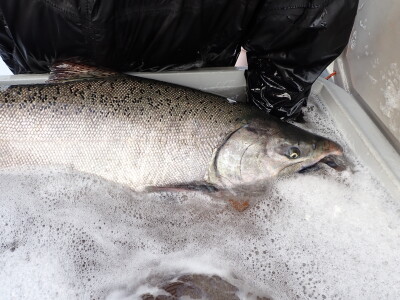Eternal return
In the fall of 1999, U.S. Sen. Olympia Snowe (R-Maine) held a hearing in Portland, Maine, in the run-up to the "looming" reauthorization of the Magnuson-Stevens Act.
"Snowe," I wrote in the Editor's Log of nine years ago this month, "playing before her constituents, had some tough questions for Penny Dalton, the top administrator at the National Marine Fisheries Service."
Snowe convened this year's meeting in the same City Hall chamber, and many of the attendees knew how to get there.
The only difference was that this time, her questions were directed at James Balsiger, who is acting director of NMFS pending the appointment of a new commerce secretary next year.
Balsiger seemed unprepared to deal with two questions, in particular. How is it, Snowe asked, that when the New England council, with its diverse constituency of environmental, recreational and commercial interests, manages after a "wrenching process" to agree, by a 15 to 1 vote, to reduce days at sea by 18 percent, the lone voice of dissent comes from NMFS' regional administrator, who vows to scrap the plan?
"How does that build confidence in the process?" she asked.
In addition, Snowe asked Balsiger how the agency planned to proceed, given the RA's conclusion that the days-at-sea reduction the council had approved would be inadequate to address overfishing. How much more can the industry absorb and still be viable, she wondered.
"We've got to find a way to mitigate this situation," she said.
Balsiger expressed NMFS' commitment to end overfishing but offered no insight into any actions the agency might take.
As if you don't know.
First, NMFS will do anything to stay out of court — unless it's to prosecute fishermen for tardy paperwork, inoperative vessel monitoring systems, unavoidable bycatch and the like. It will avoid at all costs legal battles with well-heeled conservation groups, and if capitulation means fishermen wind up with bus-tire tracks on their oilskins, no one should act surprised.
Jim Odlin, a fisherman and council member who attended the Portland hearing, said that Magnuson provides for interim regulations that reduce overfishing without ending it. Yet when asked by Snowe if he agreed with this principle, Balsiger said, "I think the agency will still work hard to end overfishing."
Apparently, the fact that reducing overfishing is a sure step down the road toward ending it is of no consequence, even if it means paychecks for fishermen and their families.
This is certainly true in New England, where a number of groundfish stocks, including Georges Bank haddock, redfish, Gulf of Maine cod and some flatfish, are well along the rebuilding path and with committed management could begin contributing to the very same communities that have suffered the most as a result of rebuilding efforts for the broader complex.
Second, the agency will support corporatization of the fleet by pushing for dedicated-access programs. And regardless of whether you believe in dedicated access yourself, there is no doubt that when access is dedicated to one group of individuals, it is just as certainly undedicated to anyone else.
In the North Pacific, plentiful and fairly pricey halibut permit the IFQ fleet to retain its composition of independent owner/operators.
But that will not always be the case. As stocks recover elsewhere, low ex-vessel prices and ever more expensive fuel may point to economic inefficiencies in an owner-operated fleet that to some minds would be rectified by fewer participants and larger vessels.
In and of themselves there is nothing wrong with big boats. But it's hard to envision catcher-processors representing economic opportunity in the gunk holes of Down East Maine, the bayous of Louisiana, and other one-time bastions of small-boat fishermen.
To that end, it was heartening to hear Snowe, who is the ranking member of the Senate Commerce Committee's subcommittee on oceans, atmosphere, fisheries and Coast Guard, assert that "we must not pursue consolidation" to the detriment of fishing communities, but it was not especially reassuring.
As I have noted, there were nine full years between the hearings I attended and the only difference was the bureaucrats Snowe felt compelled to scold. There were a lot of good feelings about Balsiger's appointment earlier this year, but he has yet to demonstrate a holistic commitment to his stated goal of "healthy stocks supporting productive fishing livelihoods in coastal communities around the nation," and in her time, Dalton never did, either.
Given the ever-downward spiral on which the New England groundfish fleet finds itself a cynic might observe, after attending those two meetings nearly a decade apart, that "the more things change, the more they stay the same."
But that is not the case. The one variable we cannot directly affect — the health of stocks — is showing real improvement, while the thing we ought to be able to improve upon — fishery management — is in a downward spiral of its own.






